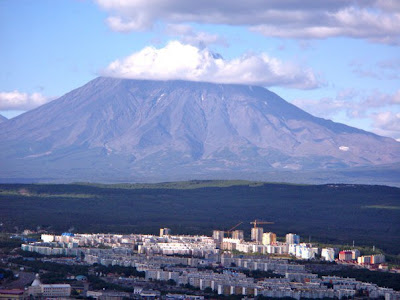Well, I'm really down to it. Tickets have been bought, bags have been packed, the apartment has been cleaned, (some) goodbyes have been said, gifts have been given. And most importantly, my final rent has been paid--and gas came out to only 110 rubles, when Darina had estimated 300, so that's a positive. I've already entered my pre-travel anxiety mode, mostly just centered on making the train station--metro--train station transfer with my luggage in order to get to the airport on time in Moscow. While I feel much more confident in my ability to deal with problems in Russia than I was ten months ago on arrival, I'd just as soon avoid any mishaps all together. I'd like to think after the gauntlet I went through to get to Russia, the universe owes me a peaceful trip home (right).
The good news is I've squared all my debts and seen nearly all of the people I've become close to a last time before my departure. I also managed to give away a lot of stuff I didn't want to take back with me, meaning my bags are a heck of a lot lighter going back just like I planned. As there's no easy mechanism for giving clothes away a la the Salvation Army, I put all the things I didn't want in bags and set them by the dumpsters, knowing that the scrounging community wouldn't let me down. They were already gone when I checked three hours later, so at least I know they'll have done someone some good. I've got all of my stuff packed and the apartment totally cleaned, but the fact that it's a furnished place with all the fixings means I keep looking around about every 25 minutes, sure that I've forgotten something. It's a bit weird, as usually when you move out of a place it's just empty so it "feels" like you're moving.
That might be the weirdest thing about this week. Even though tonight is my last night in Petrozavodsk, for some reason it doesn't feel like I'm leaving, despite all the conclusive-type things I've already done. I think part of it may have to do with the fact that I've made a few real, genuine friends here that I know I'm going to stay in touch with a almost certainly see again in the future. That, together with the fact that I'm still young and will have plenty of chances to visit Russia again, have helped to prevent an overwhelming feeling of finality from setting in. Also, I think that as much as I'll miss the people and places that have helped make this my home for nearly a year, I'm ready to conclude this short (but amazing) chapter of my life and tackle the next big challenge (just remember I've written that in August when I'm freaking out about starting law school). I might post tomorrow, but it's more likely I won't. My plan is to post a series of final thoughts about my experience after I get home, though with diving right into helping run YMCA Nationals (gymnastics) it will be closer to the end of June. So if anyone's still reading around then, stop on by!










































